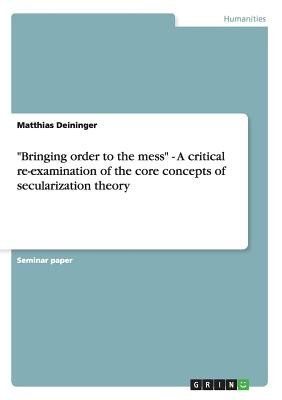
- We will send in 10–14 business days.
- Author: Matthias Deininger
- Publisher: GRIN Verlag
- ISBN-10: 3656291608
- ISBN-13: 9783656291602
- Format: 14.8 x 21 x 0.2 cm, softcover
- Language: English
- SAVE -10% with code: EXTRA
Bringing order to the mess - A critical re-examination of the core concepts of secularization theory (e-book) (used book) | bookbook.eu
Reviews
Description
Seminar paper from the year 2012 in the subject Sociology - Religion, grade: 6 (entspricht 1 in Dtschld.), University of Bern, course: Religionssoziologie, language: English, abstract: Despite Rodney Stark‟s postulate "to carry the secularization doctrine to the graveyard of failed theories" (Stark 1999:22) or David Martin‟s demand "towards eliminating the concept of secularization" (Martin 1965), the discourse on secularization seems to be as alive as ever. Indeed, from its beginnings to present the idea of secularization lies at the very core of sociological imagination. Hardly any other subject caused as much controversy among scholars as to if and how processes of secularization interrelate with the emergence of "modernity". This has led to a multitude of publications over the last decades, all redefining, defending, refuting or even rejecting secularization theory altogether. One of the main difficulties resulting from this ever expanding literature on secularization is the diverse and often undifferentiated usage of categories such as "the secular", "secularization" and "secularism". Similar to other social-scientific macro concepts the term "secularization" is multidimensional. Depending on the context and academic discipline, it is applied very differently, thus leaving the door wide open for manifold possibilities of interpretations and meanings. This especially poses problems to any empirical researcher; as such an amorphous term with respectively different meanings and ambiguous possibilities of interpretation is hard to operationalize (Casanova 1994: 12). The aim of this paper is therefore, to critically review the main concepts of secularization theory. For this purpose, I will analytically distinguish between "the secular" as a theological category of Western Christendom, "secularization" as a historical process referring to state-church relations and "secularization" as an analytical conceptualization of modern world-historical processes. By doing so,
EXTRA 10 % discount with code: EXTRA
The promotion ends in 19d.15:55:28
The discount code is valid when purchasing from 10 €. Discounts do not stack.
- Author: Matthias Deininger
- Publisher: GRIN Verlag
- ISBN-10: 3656291608
- ISBN-13: 9783656291602
- Format: 14.8 x 21 x 0.2 cm, softcover
- Language: English English
Seminar paper from the year 2012 in the subject Sociology - Religion, grade: 6 (entspricht 1 in Dtschld.), University of Bern, course: Religionssoziologie, language: English, abstract: Despite Rodney Stark‟s postulate "to carry the secularization doctrine to the graveyard of failed theories" (Stark 1999:22) or David Martin‟s demand "towards eliminating the concept of secularization" (Martin 1965), the discourse on secularization seems to be as alive as ever. Indeed, from its beginnings to present the idea of secularization lies at the very core of sociological imagination. Hardly any other subject caused as much controversy among scholars as to if and how processes of secularization interrelate with the emergence of "modernity". This has led to a multitude of publications over the last decades, all redefining, defending, refuting or even rejecting secularization theory altogether. One of the main difficulties resulting from this ever expanding literature on secularization is the diverse and often undifferentiated usage of categories such as "the secular", "secularization" and "secularism". Similar to other social-scientific macro concepts the term "secularization" is multidimensional. Depending on the context and academic discipline, it is applied very differently, thus leaving the door wide open for manifold possibilities of interpretations and meanings. This especially poses problems to any empirical researcher; as such an amorphous term with respectively different meanings and ambiguous possibilities of interpretation is hard to operationalize (Casanova 1994: 12). The aim of this paper is therefore, to critically review the main concepts of secularization theory. For this purpose, I will analytically distinguish between "the secular" as a theological category of Western Christendom, "secularization" as a historical process referring to state-church relations and "secularization" as an analytical conceptualization of modern world-historical processes. By doing so,


Reviews